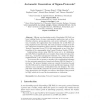163 search results - page 27 / 33 » Computationally Convincing Proofs of Knowledge |
CCS
2001
ACM
13 years 11 months ago
2001
ACM
We present a mathematical construct which provides a cryptographic protocol to verifiably shuffle a sequence of k modular integers, and discuss its application to secure, universa...
EUROPKI
2009
Springer
13 years 5 months ago
2009
Springer
Efficient zero-knowledge proofs of knowledge (ZK-PoK) are basic building blocks of many cryptographic applications such as identification schemes, group signatures, and secure mult...
CRYPTO
2009
Springer
14 years 2 months ago
2009
Springer
We present the first signature scheme which is “short”, stateless and secure under the RSA assumption in the standard model. Prior short, standard model signatures in the RSA...
MMSEC
2006
ACM
14 years 1 months ago
2006
ACM
Current zero-knowledge watermark detectors are based on a linear correlation between the asset features and a given secret sequence. This detection function is susceptible of bein...
ACNS
2004
Springer
13 years 11 months ago
2004
Springer
The concept of group signature allows a group member to sign message anonymously on behalf of the group. In the event of a dispute, a designated entity can reveal the identity of a...

